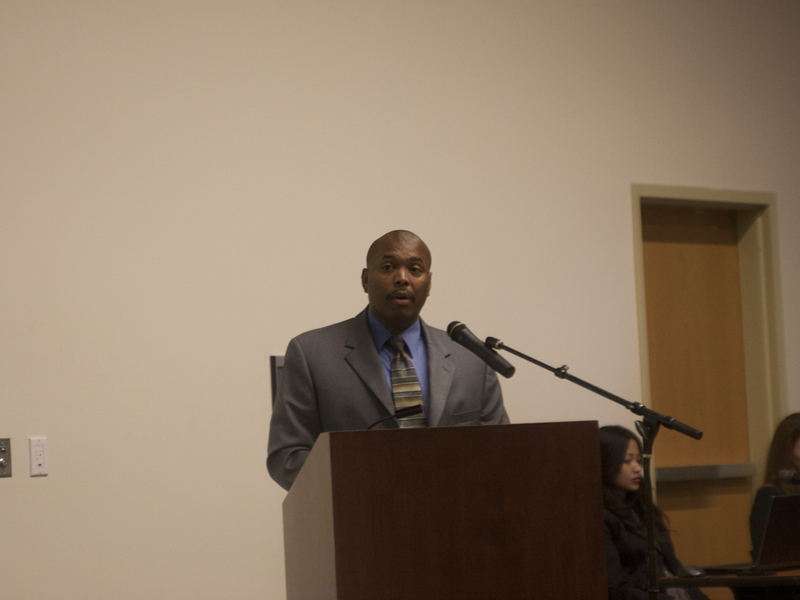
As the last installment to the UCR Task Force on Campus Safety meetings, an open house was held on May 23 at noon in HUB 302 to discuss the release of 40 safety recommendations, which will be presented to campus management for further action.
In attendance were several of the group’s members, including Interim Vice Chancellor Charles Rowley, UCR Chief of Police Mike Lane, Lieutenant Andy Flores of the Riverside Police, as well as non-affiliated staff, students and residents of the community.
One of the first issues discussed was racial profiling, a problem that several African-American students brought to the attention of the task force when it held its town hall on April 4.
According to Lane, “The UCPD Scot Alerts sent via e-mail to our community has caused concern among some African-American students … some students perceive the descriptions as being too general or matching the looks of many of them.” As a result, several changes were made to some of UCPD’s reporting methods.
Starting April 28, UCPD’s crime alerts ceased including race of suspects in the e-mail, describing only the crime, location and their actions. Students will be instructed to go to the UCPD website where more information can be found. A campaign about the importance of students carrying their IDs was also mentioned, as well as diversity and cross-cultural classes that will be taught to UCPD in the upcoming summer.
Rowley proceeded to specifically speak about the 40 recommendations that were released online on May 8. “We had three meetings where we discussed three specific topics,” Rowley said. “And that was: How could we enhance security around the campus, on the campus, and what can we do to improve communications and awareness about steps that folks can do to increase safety?”
The number one recommendation that was made by members of the group was the Point-to-Point (P2P) Shuttle Service that takes students from the Coffee Bean to homes and apartments within a three-mile radius. The P2P was started May 20 and operates from 7 p.m. to 11 p.m.
Other top recommendations included increasing the number of officers patrolling on bikes, deploying cameras in public places and creating a sustainable plan for patrolling areas that are heavily impacted. Attendees were then asked to state any concerns or questions about the task force and its effort.
David F. Chavez, a first-year Ph.D. student in the history department was the first to go up. He immediately expressed his disapproval with the increased presence of police.
“I want a complete halt to these task force activities,” Chavez said. “And here’s why: I don’t think we’re not really looking at the context of what is happening here in Riverside … the unemployment rate is over 12 percent for adults but for young people of color, it’s between 20 and 30 percent.”
Chavez advocated that the community and its leaders should be pressuring the city to invest in programs to help people get jobs instead of spending money on more enforcement.
He specifically took issue with the proposal that deals with the homeless and questioned if the city was planning on building shelters or resorting to relocating the population. The initiative entitled “Homeless Population – Working with the City,” states that UCR should work with the city to deal with the increasing homelessness around campus, such as the University Extension Center.
According to members of the audience, the increased surveillance of police officers does not equate to a higher degree of safety on campus. Instead, they believe, the increased presence of law enforcement officers creates an unsafe environment.
ASUCR Vice President of Internal Affairs and member of the task force, Kevin Jo, said, “But I would also be careful with what they were saying because, much like how — I’m not trying to defend anyone — but much how like the task force was, for lack of a better term ‘accused’ of generalizing the homeless population, generalizing what a police officer is kind of also an issue as well,” Jo said. He felt that it was not safe to assume all officers are out on patrol to be intimidating or forceful.
ASUCR Senator Aaron Johnson also commended the task force and police on their work and mentioned that he does feel safer due to increased police patrols. He also brought up the issue of the homeless, who often find refuge at the campus libraries and may cause discomfort for many students.
Rowley gave his reflections on the event, saying, “It accomplished what I hoped it would accomplish, which was allowing the community that [was] here present to have an opportunity to review and listen to the task force recommendations but also have an understanding of how it was that the task force came to its conclusions.”
Rowley highlighted the importance of public input. He also mentioned his satisfaction with the collaboration between Lane and African Student Programs to come up with new safety methods.
In respect to the Ph.D. student’s comment, Rowley said that despite the causes of crime, whether it be because of poverty or housing, the duty of the task force was not to solve this issue specifically.
“The purpose of this committee was how do we address the safety and security of our campus community,” said Rowley. “And so I think we responded and dealt with that. But I do welcome those comments [of the Ph.D. students].”








